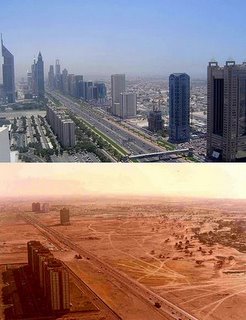"Crude" Oil
 Living in countries where the price of gasoline was lower than the price of drinking water, by a huge margin, I mean you could get 4 liters of gasoline for the price of one liter of water. The country grew to such a wealth in such a short amount of time. Look at this photo of Dubai, UAE, the before picture is from 1981 and the after picture is from 2001. The difference in 20 years is phenomenal. The Oil producing countries have prospered overnight as it seems since oil was first discovered in the region in the 1960s. But they are not the only ones that have prospered, the oil companies have prospered even more.
Living in countries where the price of gasoline was lower than the price of drinking water, by a huge margin, I mean you could get 4 liters of gasoline for the price of one liter of water. The country grew to such a wealth in such a short amount of time. Look at this photo of Dubai, UAE, the before picture is from 1981 and the after picture is from 2001. The difference in 20 years is phenomenal. The Oil producing countries have prospered overnight as it seems since oil was first discovered in the region in the 1960s. But they are not the only ones that have prospered, the oil companies have prospered even more.Exxon Mobil made a record $36 billion profit last year, a year when oil prices were also at record levels. The price of crude oil has doubled since a decade ago and there seems to be no end to this price rise. How do the oil companies continue to make profits when the price of crude is at record levels? The answer is simple, they have increased the price of refined petroleum even more than required to offset the increased cost of crude oil. Today, Exxon Mobil has become the biggest company in the world, and was it a country of its own, it would rank 27th in terms of GDP. [source]
The fault does not lie with the oil companies though. After all, they are in the business of selling a scarce resource. The fault lies with the consumers who have developed such an oil culture. Why are we so dependent on oil? What will we do when the oil runs out as we have been taught since elementary school that it will in 80 years or so?
The difference in culture is vast between Europe and the US. In Europe, people are taught from a young age about the effects of fossil fuels. Renewable sources of energy are indoctrinated into the minds of young ones. I still remember at least 6 methods of renewable energy from my early years there. They are taught about the Exxon Valdez disaster of 1989. I have been an eyewitness of an oil spill in Kuwait in the 80s. We took a weekly trip to the beach and there we saw that there had been an oil spill the night before. The beach was covered in oil. Seagulls were now black instead of white and they could no longer fly as their wings were too heavy from the oil. That beach took a long time to clean up.
Japanese car companies have been pioneers in developing hybrid vehicles. Never mind the 60 mpg Toyota Prius but a regular Camry also goes 34 mpg. Compare that with a Chrysler 300C which goes 23 mpg or the horrendous Hummer H2 with its 12 mpg mileage. The American auto industry has been slow to shift but they are not entirely to blame. The demand for SUVs and large sedans is still considerably higher in the US. Anyone who has ever been elsewhere would be certain to tell you the difference they see in cars. Smaller 1.8 liter engines are sufficient in most of Europe and Asia. Public transportation is encouraged by the governments, just today the UK government made it free for children under 18 to use the bus. Many towns in Europe have bicycle lanes throughout the city and the central commercial area is often closed to cars. People often choose to walk to the store then drive there and find parking, perhaps that’s why obesity is less of a problem there too.
What steps are you willing to take to reduce your dependence on oil? Are you willing to use public transportation, or even buy a more fuel economic car? Is the extra horsepower of the 6-cylinder engine worth more to you than the price you pay at the gas pump? If you don’t make a change in your lifestyle, don’t expect the government or the industry to make it for you.



1 Comments:
I liked this article. You did a good job of integrating personal experience with ideas for policy. In the beginning I thought you were going to attack Big Oil, but I was pleasantly surprised. It actually goes well with my article explaining the price of gas. I think that the reason why more isn't done to protect the environment and deal with our oil addiction is that it doesn't seem reasonable. In the short-run, it would cost us a great sum to deal with the problem. And there isn't enough convincing evidence on the long-run adverse environmental effects (i.e. global warming). Even scientists cannot agree on how much of the greenhouse gases are human produced and how adverse the effects will be. And if the scientific community cannot agree, they are losing a lot of leverage in convincing the political community in enacting new policy.
By Karolina, at 5/10/2006 7:33 PM
Karolina, at 5/10/2006 7:33 PM
Post a Comment
<< Home